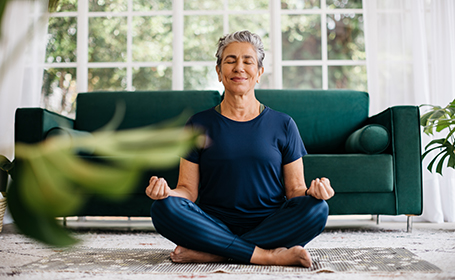
What is self-care and why is it important?
The term self-care is used a lot these days, but what does it really mean? We take a look at what self-care means in practice and consider the benefits to your health - both mental and physical
What is self-care?

While its popularity in common parlance might be recent, self-care is not a new concept. Nor is it complex, lofty or exclusive. Self-care is just what it sounds like: taking care of yourself in a way that works for you.
According to the NHS, self-care is the practice of consciously doing things that preserve or improve your mental or physical health.
These days, when people talk about self-care they are generally talking about the conscious and deliberate choice to do something that looks after you and your wellbeing.
This covers the mental and the physical, and a regime of self-care should improve the way you feel in body and mind. Engaging in acts of self-care or a self-care routine (as many people refer to it), is clinically proven to help reduce or eliminate stress by helping you foster good habits and understand your needs.
Why is self-care important?
Self-care is an important part of living a healthy and happy lifestyle. Looking after yourself both mentally and physically is crucial to taking control of your health.
We lead increasingly busy lives and it can be easy to forget to put yourself first, especially if you have multiple responsibilities and other people to care for. But looking after yourself will make you feel better, and the better you feel, the better you will be in all areas of your life - from work to relationships.
Self-care doesn't have to involve a huge time commitment and it doesn't have to cost the earth. It could be taking a bath, relaxing with a good book, taking a walk outside or eating your favourite food. It's about making a commitment to putting yourself first, even just for a while.
Anything you do for yourself that makes yourself feel better or cared for can be considered self-care.
What are examples of self-care?
This question is a little harder to answer, because self-care is different for everyone. It's about looking after yourself mentally and physically, and everyone has different needs.
Really, anything you do for yourself that makes yourself feel better or cared for can be considered self-care. This could be making sure to floss regularly, it could be taking time to yourself when you need it, it could be getting a new haircut.
The term self-care is also used in the medical community to refer to individuals taking charge of their own health. This includes everything from making healthy lifestyle choices to taking an active part in managing long-term conditions.<.p>
Some people consider meditation a major component of self care. Meditation isn't about transforming yourself or your outlook, it is simply about channelling your awareness and developing a better sense of perspective. Learning to meditate takes time, because it is a skill like any other. The act of meditation involves breath work and focus to be present in the moment and connect with your breathing. Meditation can significantly improve your mental health and become a regular part of your self-care practice.
10 easy ways to practice self-care without spending money
Self-care doesn't have to cost the earth. Here are some of our top tips for self-care that won't break the bank:
- Get a good night's sleep
- Drink lots of water
- Go for a brisk walk
- Take a relaxing bath
- Say no to something you don't want to do
- Listen to your favourite music
- Watch your favourite film
- Make something healthy yet delicious for dinner
- Make a list of five or more things you like about yourself
- Spend time with loved ones

What are the benefits of self-care?
Self-care has a number of benefits, most of which are interlinked. Committing to self-care should improve your wellbeing all round.
Self-care can improve your physical health
A big part of self-care is committing to looking after your body and becoming more attuned with its needs. Whether it's brushing your teeth, exercising more or getting enough sleep each night, part of any programme of self-care should focus on looking after your physical health. The National Institute of Medicine has published several studies on the importance of exercising as a means of self care. These studies recommend just 30 minutes of walking every day to help boost your mood and improve your health. They stress that small amounts of exercise add up, so don’t be discouraged if you can’t do 30 minutes at one time.
Self-care can reduce stress and anxiety
Making time for relaxing activities, such as taking a warm bath, listening to music or practising yoga or meditation, is another common theme of self-care.
Any activity that makes you feel more relaxed can help to reduce symptoms of stress and anxiety and to lift your mood.
Taking time to relax and look after yourself can have a positive impact on the way you see yourself: treating yourself with kindness can make you look upon yourself more kindly.
Self-care can boost your self-esteem
As well as helping to calm your nerves, taking time to relax and look after yourself can have a positive impact on the way you see yourself: treating yourself with kindness can make you look upon yourself more kindly.
Studies by The National Library of Medicine have found that people with higher self-esteem find it easier to deal with setbacks and are more likely to achieve goals of self-improvement. Self-care can include regular exercise, which helps you stay physically and mentally fit, which can have a positive impact on your self esteem.
Self-care protects your mental health
Making changes to prioritise self-care can help to manage mental health issues and might even prevent them from getting worse.
Of course, self-care is not a substitute for professional help, and you shouldn't feel you have to tackle your problems alone. If your mental health is suffering, you should always talk to someone.
However, if you're looking to improve your mental wellbeing, taking the time to care for yourself both mentally and physically is really important.
The National Institute of Health has published a self-help, online wellness kit to help you understand best how to look after yourself through a variety of tools.
Self-care can lead to better relationships
It makes sense if you think about it: the happier and healthier you are, the more you can give to a relationship. Not just romantic relationships, but relationships with friends and family, too. If you feel good about yourself, you feel happy and healthy enough to put more attention and time into relationships. Having a solid support network around you is also good for your mental wellbeing, and practising self care can help you foster this network.
This is especially important if you are a parent or carer. It can be so easy to put someone else's needs first, but you must look after your own health too.
Learn more about self-care and protecting your mental health
Cognitive behavioural therapy is a form of talking therapy that can vastly improve your mental health and help you prioritise self-care. We have a range of cognitive behavioural therapists who can help you develop your relationship with self care. Book an appointment with one today.
Tags
How do I book an appointment?
If you're concerned about symptoms you're experiencing or require further information on this subject, talk to a GP or see an expert consultant at your local Circle Hospital.